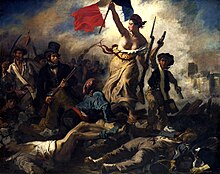People
Concepts
Legal

Chapter One, Article One of the Charter of the United Nations states that "peoples" have the right to self-determination. Though the mere status as peoples and the right to self-determination, as for example in the case of Indigenous peoples (peoples, as in all groups of indigenous people, not merely all indigenous persons as in indigenous people), does not automatically provide for independent sovereignty and therefore secession. Indeed, judge Ivor Jennings identified the inherent problems in the right of "peoples" to self-determination, as it requires pre-defining a said "people".
Constitutional
Both the Roman Republic and the Roman Empire used the Latin term Senatus Populusque Romanus, (the Senate and People of Rome). This term was fixed abbreviated (SPQR) to Roman legionary standards, and even after the Roman Emperors achieved a state of total personal autocracy, they continued to wield their power in the name of the Senate and People of Rome.
The term People's Republic, used since late modernity, is a name used by states, which particularly identify constitutionally with a form of socialism.
Judicial
In criminal law, in certain jurisdictions, criminal prosecutions are brought in the name of the People. Several U.S. states, including California, Illinois, and New York, use this style. Citations outside the jurisdictions in question usually substitute the name of the state for the words "the People" in the case captions. Four states — Massachusetts, Virginia, Pennsylvania, and Kentucky — refer to themselves as the Commonwealth in case captions and legal process. Other states, such as Indiana, typically refer to themselves as the State in case captions and legal process. Outside the United States, criminal trials in Ireland and the Philippines are prosecuted in the name of the people of their respective states.
The political theory underlying this format is that criminal prosecutions are brought in the name of the sovereign; thus, in these U.S. states, the "people" are judged to be the sovereign, even as in the United Kingdom and other dependencies of the British Crown, criminal prosecutions are typically brought in the name of the Crown. "The people" identifies the entire body of the citizens of a jurisdiction invested with political power or gathered for political purposes.
See also
References
- ^ "Definition of People". Collins Dictionary.
- ^ "Charter of the United Nations: Chapter I: Purposes and Principles". United Nations. Archived from the original on 8 May 2015. Retrieved 22 April 2013.
- ^ Shrinkhal, Rashwet (2021). ""Indigenous sovereignty" and right to self-determination in international law: a critical appraisal". AlterNative: An International Journal of Indigenous Peoples. 17 (1). SAGE Publications: 71–82. doi:10.1177/1177180121994681. ISSN 1177-1801. S2CID 232264306.
- ^ See the following:
- Shaw, Malcolm Nathan (2003). International law. Cambridge University Press. p. 178.
Article 1 of the Montevideo Convention on Rights and Duties of States, 1 lays down the most widely accepted formulation of the criteria of statehood in international law. It notes that the state as an international person should possess the following qualifications: '(a) a permanent population; (b) a defined territory; (c) government; and (d) capacity to enter into relations with other states'
- Jasentuliyana, Nandasiri, ed. (1995). Perspectives on international law. Kluwer Law International. p. 20.
So far as States are concerned, the traditional definitions provided for in the Montevideo Convention remain generally accepted.
- Shaw, Malcolm Nathan (2003). International law. Cambridge University Press. p. 178.
- ^ Mayall, James (2013). "International Society, State Sovereignty, and National Self-Determination". In Breuilly, John (ed.). The Oxford Handbook of the History of Nationalism. Oxford: Oxford University Press. p. 542. ISBN 978-0-19-876820-3.
- ^ See, e.g., California v. Anderson 6 Cal. 3d 628; 493 P.2d 880; 100 Cal. Rptr. 152; 1972 Cal. LEXIS 154 (1972)
- ^ See generally, The Bluebook: A Uniform System of Citation, rule 10.
- ^ Black's Law Dictionary, 5th ed., "People".
External links
 The dictionary definition of people at Wiktionary
The dictionary definition of people at Wiktionary